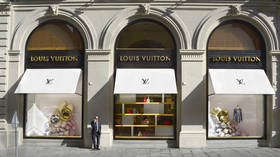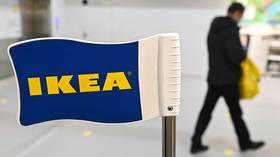International brands scammed Russians – reports

Thousands of Russians have lost the money they spent on gift cards after many foreign brands decided to stop serving the world’s largest nation in response to Moscow’s military operation in Ukraine.
Major Russian newspaper Komsomolskaya Pravda (KP) published a report on Thursday claiming that the country’s consumers have lost billions of rubles after many foreign brands left the national market without reimbursing them for gift cards that were previously issued.
Among the foreign companies that have decided to close their shops in Russia are Sweden’s H&M, Spain’s Mango, Zara, and Bershka, as well as America’s Nike and Germany’s Adidas. None of these brands have said whether they’re going to reopen their stores.
In an interview with KP, one dissatisfied customer shared his concerns. “I bought my wife a present – a gift card from Mango. I put 10,000 rubles on it. [Last week], we went to a Mango store but it was already closed. And no one has explained what to do with this card now,” complained Muscovite Viktor Vodyanitsky. “Did they steal this money from us?” he asked.
The boycott of the Russian market by foreign companies comes in response to Moscow’s military action in Ukraine. Since the Kremlin launched its offensive on February 24, dozens of international brands have announced their intention to close their businesses in Russia while the US and its allies have imposed new unprecedented sanctions on Moscow.
Kremlin spokesman Dmitry Peskov has admitted that these actions have had “quite a shock effect” on the Russian economy. He also refused to set out any likely scenarios for the future, saying “We have never faced such an economic war against our country in the past; so it is very difficult to predict anything."
“Now what we need is not predictions but action aimed at mitigating the negative consequences and further risks,” he concluded.
Other Russian officials suggest the situation should be used for the country’s benefit since it gives Moscow an excellent opportunity to promote local products as a part of an import-substitution strategy.
Non-profit organization, the Public Consumer Initiative, has gone even further by proposing to nationalize 59 foreign companies that have left the Russian market without providing any guarantees to its consumers. The list includes such big names as Volkswagen, Apple, IKEA, Microsoft, and McDonald’s.
A member of the ruling party United Russia, Andrey Turchak, supported this proposal, saying “This is an extreme measure, but we will not tolerate stabs in the back, and we will protect our people.”














